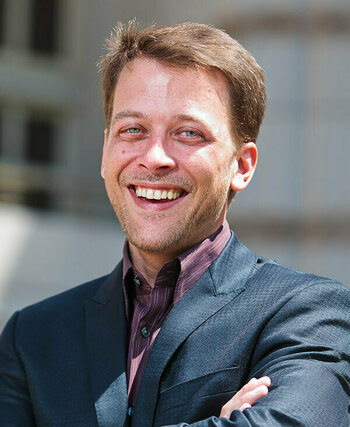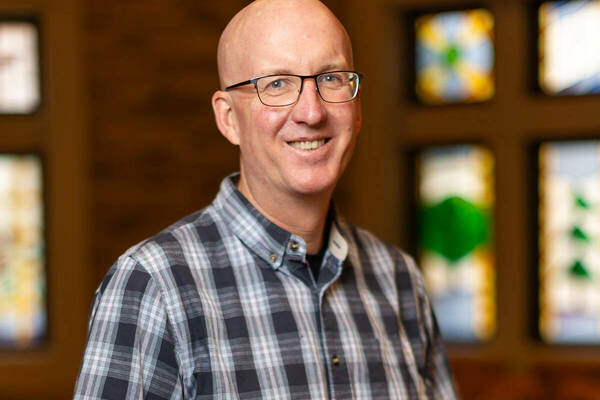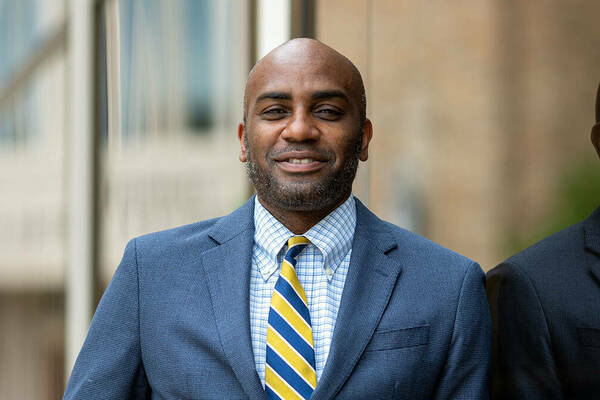Shakespeare at Notre Dame recently won a prestigious award for its efforts to convene Shakespeare in prison practitioners from around the world as well as a new grant for its work bringing the Bard to a local residential treatment facility for juveniles.

“Shakespeare at Notre Dame is the social justice mission of the University in action through the performing arts,” said Scott Jackson, the Mary Irene Ryan Family Executive Director of Shakespeare at Notre Dame. “We can be a community driver of change.”
In May, Jackson earned the 2022 Shakespeare Association of America’s Shakespeare Publics Award for the 4th International Shakespeare in Prisons Conference. Produced in partnership with the Folger Institute in Washington, D.C., the conference was honored for its culturally significant efforts to sustain broad and diverse Shakespeare programs through teaching, scholarship, performance, and activism.
And in June, Shakespeare at Notre Dame received a $20,000 Shakespeare in American Communities: Juvenile Justice grant to illuminate the playwright’s works and address them in a modern context at DePaul Academy, a residential treatment facility in South Bend for males 14–18 years old. This is Shakespeare at Notre Dame’s third consecutive grant from Shakespeare in American Communities, which is funded by the National Endowment for the Arts in partnership with Arts Midwest.

The program at DePaul — which participating students have dubbed “The Shakespeare Squad” — is the brainchild of Grant Mudge, the Ryan Producing Artistic Director of the Notre Dame Shakespeare Festival, and is now entering its fourth year.
He was inspired to launch the DePaul program after seeing the impact of Shakespeare programs in a number of correctional facilities, including Jackson's efforts at the Westville Correctional Facility in Indiana. Both Grant and Jackson wondered if similar methods could be an effective intervention for at-risk juveniles.
“We had been seeking a way to work ‘upstream,’ with the eventual goal of keeping kids out of the prison system,” he said of the juvenile justice program. “We certainly know and believe in its contributions to the lives of young people.”
DePaul students believe it, too. More than 70 have been “Squad” members since the program’s 2019 launch. And another 200-plus have attended Shakespeare Squad performances, as well as those of visiting troupes and plays staged at Notre Dame and at the South Bend Fringe Festival.
DePaul participants have demonstrated agency by creating theatre with the teaching artists, said Mudge, even when the pandemic occasionally forced the program online.
“The plays themselves promote empathy, and the hindsight on language — the perspective changes between 2022 and 1600 — are of immense value as we learn about our world, and each other,” he said.
The pandemic also impacted the Shakespeare in Prisons Conference, which Jackson, Tofteland, and Peter Holland, the McMeel Family Chair in Shakespeare Studies, originated at Notre Dame in 2013.
The conference is part of the Shakespeare in Prisons Network — a global forum for the prison and arts practitioner community to use the power of the poet’s works to bridge “the space between our shared humanity and the isolation typical of incarcerated and marginalized individuals.”
When the conference — slated to be held over five days in 2020 at Notre Dame — moved online due to the pandemic, Jackson and fellow planners reimagined the format.
“We decided to have the world’s longest conference,” Jackson said. “We wanted to interrogate Shakespeare at his best and worst, as a beacon of hope and a beacon of oppression.”
Weekly opportunities to share challenges and best practices of prison arts, and to learn about anti-racism, trauma-informed teaching, and healing, resonated. Nearly 270 people from six continents, 14 nations, and 28 states took part.
Jackson, who recently accepted the award in Jacksonville, Florida, on behalf of the conference organizing committee, continues to be inspired by what he sees happening in the Shakespeare class he leads at the Westville prison.
He strives to provide opportunities for incarcerated men — who routinely are in a fight-or-flight state — to discover joy, trust, and self-awareness.
“Sometimes they are empowered and realize their own potential in those moments,” Jackson said. “It’s incredibly rewarding.”


